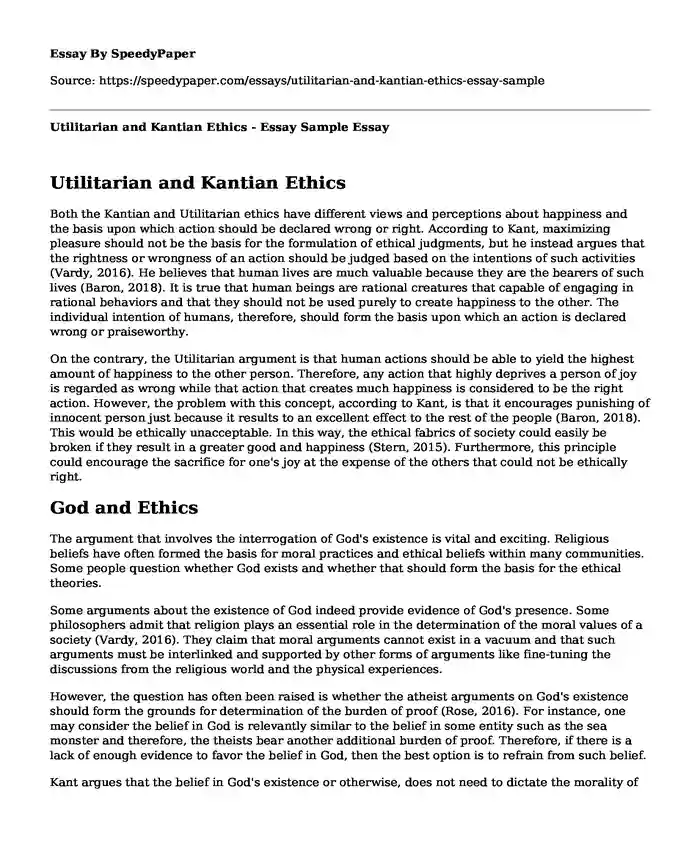
| Type of paper: | Essay |
| Categories: | Philosophers Immanuel Kant |
| Pages: | 3 |
| Wordcount: | 609 words |
Utilitarian and Kantian Ethics
Both the Kantian and Utilitarian ethics have different views and perceptions about happiness and the basis upon which action should be declared wrong or right. According to Kant, maximizing pleasure should not be the basis for the formulation of ethical judgments, but he instead argues that the rightness or wrongness of an action should be judged based on the intentions of such activities (Vardy, 2016). He believes that human lives are much valuable because they are the bearers of such lives (Baron, 2018). It is true that human beings are rational creatures that capable of engaging in rational behaviors and that they should not be used purely to create happiness to the other. The individual intention of humans, therefore, should form the basis upon which an action is declared wrong or praiseworthy.
On the contrary, the Utilitarian argument is that human actions should be able to yield the highest amount of happiness to the other person. Therefore, any action that highly deprives a person of joy is regarded as wrong while that action that creates much happiness is considered to be the right action. However, the problem with this concept, according to Kant, is that it encourages punishing of innocent person just because it results to an excellent effect to the rest of the people (Baron, 2018). This would be ethically unacceptable. In this way, the ethical fabrics of society could easily be broken if they result in a greater good and happiness (Stern, 2015). Furthermore, this principle could encourage the sacrifice for one's joy at the expense of the others that could not be ethically right.
God and Ethics
The argument that involves the interrogation of God's existence is vital and exciting. Religious beliefs have often formed the basis for moral practices and ethical beliefs within many communities. Some people question whether God exists and whether that should form the basis for the ethical theories.
Some arguments about the existence of God indeed provide evidence of God's presence. Some philosophers admit that religion plays an essential role in the determination of the moral values of a society (Vardy, 2016). They claim that moral arguments cannot exist in a vacuum and that such arguments must be interlinked and supported by other forms of arguments like fine-tuning the discussions from the religious world and the physical experiences.
However, the question has often been raised is whether the atheist arguments on God's existence should form the grounds for determination of the burden of proof (Rose, 2016). For instance, one may consider the belief in God is relevantly similar to the belief in some entity such as the sea monster and therefore, the theists bear another additional burden of proof. Therefore, if there is a lack of enough evidence to favor the belief in God, then the best option is to refrain from such belief.
Kant argues that the belief in God's existence or otherwise, does not need to dictate the morality of actions within the society. He holds that any moral and rational human being should believe that moral virtues are the foundation for happiness (Baron, 2018). In so doing, a person cannot have the will to such an end without believing that morality could contribute to achievement such an end (Vardy, 2016). Concisely, Kant argued that the theoretical debate on the existence of God was more unsuccessful and that morality and ethics need to be subjected to a postulate of practical reason (Rose, 2016).
References
Baron, M. W. (2018). Kantian ethics almost without apology. Cornell University Press.
Rose, M. (2016). Ethics with Barth: God, Metaphysics, and Morals. Routledge.
Stern, R. (2015). Kantian ethics: Value, agency, and obligation. Oxford University Press, USA.
Vardy, P. (2016). The puzzle of ethics. Routledge.
Cite this page
Utilitarian and Kantian Ethics - Essay Sample. (2022, Feb 23). Retrieved from https://speedypaper.com/essays/utilitarian-and-kantian-ethics-essay-sample
Request Removal
If you are the original author of this essay and no longer wish to have it published on the SpeedyPaper website, please click below to request its removal:
- Free Essay on Measuring Marketing Effectiveness
- Free Essay on Strategies of Multinational Companies
- Free Essay: Zoos Are Internment Camps of Animals and Should Be Shut Down
- Shame and I Became Her Target - Essays Analysis Example
- Essay Example on Famous Killer in Canada: Allan Legere
- Essay Sample on Life-Changing Moment
- How to Write a Research Proposal? Free Essay Example
Popular categories




